A Guide to Freehold Areas in Dubai's Real Estate
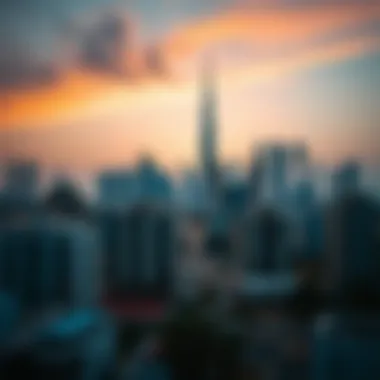
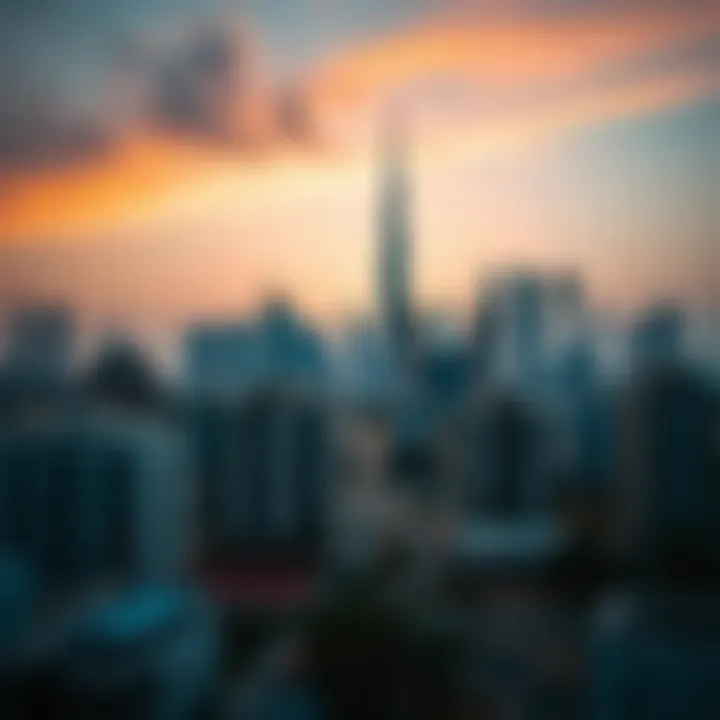
Intro
Navigating the real estate landscape of Dubai can feel like decoding a complex puzzle, especially when it comes to understanding freehold areas. The allure of owning property in this rapidly developing metropolis is something that entices many local and international investors alike. Freehold areas stand out because they grant full ownership rights to buyers, which significantly contrasts with leasehold arrangements. Understanding the significance of these areas is key for anyone considering investment in Dubai's vibrant property market.
This article aims to provide an in-depth exploration of freehold areas. We’ll examine the current trends shaping this market, discuss strategic investment methods, and outline the potential pitfalls buyers and investors should be aware of. By the time you finish reading, you'll be equipped to make educated decisions in Dubai’s real estate arena.
Market Trends
Current Property Prices
The fluctuation in property prices can resemble the tide; sometimes rising, and at other times receding. As of late, the freehold market has shown a notable increase in demand. For instance, areas like Dubai Marina and Downtown Dubai continue to attract substantial interest, leading to price hikes. It's not just the luxury segments either; competitive pricing in more affordable districts like Jumeirah Village Circle (JVC) have captured the attention of first-time buyers. In recent reports, the average price per square foot has seen a slight uptick, indicating renewed vigor in the market.
- Dubai Marina: AED 1,800/sq ft
- Downtown Dubai: AED 2,800/sq ft
- Jumeirah Village Circle: AED 1,000/sq ft
This trend suggests that buyers are willing to put their money where their preferences lie, often prioritizing lifestyle and amenities. More people are now viewing property purchases not just as an investment, but as a key to a sought-after lifestyle.
Upcoming Developments
The skyline of Dubai changes almost weekly, with multiple developments on the horizon. New projects in the pipeline promise exciting opportunities for buyers. For instance, the Dubai Creek Harbour and Dubai Hills Estate are set to redefine urban living, offering a mix of luxury, convenience, and futuristic design. Projects like these are positioned to stimulate growth in the freehold market further, catering to a diverse array of potential buyers, from expatriates to local families.
These areas are designed with consideration for lifestyle and sustainability, often incorporating parks, retail, and leisure spaces, which enhances their appeal significantly.
Investment Strategies
Financing Options
Investing in real estate isn't just about finding the right property; it's also about securing the right financing. In Dubai, the variety of funding options can be overwhelming. Buyers can explore traditional banks or opt for mortgage providers who specialize in expat loans. Different banks have their unique criteria, and it’s vital to shop around for the best rates. Here’s a list of popular financing options:
- Bank Mortgages: Typically cover up to 80% of the property price.
- Developer Financing: Sometimes these options allow buyers to stretch payments over time while the property is under construction.
- Cash Purchases: This method remains king, especially in the competitive freehold market, as it often leads to better negotiation on prices.
Risk Management Tips
Real estate investments come with their own set of risks. Understanding potential challenges is necessary to safeguard your investment. Here’s what you can do:
- Conduct Thorough Research: Know the area inside-out before making any commitments. Look at market trends and property histories.
- Work with Trusted Agents: A good real estate agent can provide insights that aren’t readily available online.
- Legal Consultation: Always consider legal advice to navigate contracts and ownership regulations. Understanding the fine print can save hefty costs down the line.
By allowing for meticulous planning and understanding the lay of the land, investors can make strides towards successful property ventures.
"Investing in freehold properties is more than a financial decision; it’s establishing roots in one of the world’s most dynamic environments."
Understanding Freehold Property
In the dynamic landscape of Dubai's real estate sector, comprehending the nuances of freehold property is essential for any would-be investor or homeowner. It embodies not just an investment opportunity, but also a gateway to shaping one’s living environment in the heart of one of the world's most ambitious cities. The term ‘freehold’ indicates full ownership of the land and the property built upon it, a concept that attracts attention from both local and overseas investors. The enticement is clear: owning property outright means not having to worry about the constraints typical of leasehold agreements, like limited tenure or complex renewal processes.
Definition and Legal Framework
At its core, a freehold property grants owners complete control, setting it apart from other forms of property ownership in Dubai. Such properties fall under a well-defined legal framework, established by the Emirate’s government. This framework is crucial as it outlines ownership rights, responsibilities, and various regulations, safeguarding both the buyers and the interests of the state.
Under the newly established laws, freehold properties are accessible to foreign investors, enabling them to fully own their real estate without the need for a local partner. A practical example would be Dubai Land Department (DLD), which administers laws concerning property registration and transfers. This reinforces the notion that when you purchase a freehold property, you're not just acquiring space but anchoring yourself within a robust legal structure that promotes a safe and orderly real estate environment.
Key Differences Between Freehold and Leasehold
Understanding the difference between freehold and leasehold is like comparing apples and oranges, each with its own flavor and appeal. Here’s a brief breakdown:
- Duration: Freehold ownership is eternal; once you own it, it’s yours forever. Leasehold, on the other hand, is typically a long-term lease, often lasting for 30 years, after which ownership may revert back to the landowner.
- Rights: Freehold grants a plethora of rights allowing for modification, sale, or rental. Leaseholders may have restrictions on renovations or subletting, depending on the lease agreement.
- Investment Potential: Freehold properties typically carry a higher value due to full ownership benefits, appealing more to investors looking for long-term gains.
In many ways, freehold ownership encapsulates freedom in property investment— where one can truly make a piece of Dubai theirs, unencumbered by the strings attached to a leasehold arrangement.
"Owning real estate outright is like having a butterfly in your hand; there’s immense beauty in being untethered."
Investors and buyers looking into Dubai's ever-expanding skyline need to realize that navigating the seas of property ownership begins with grasping the fundamental principles surrounding freehold properties. This knowledge serves as the cornerstone enabling smart decisions aligned with one’s goals in the bustling Dubai property market.
The Freehold Revolution in Dubai
The freehold revolution in Dubai marks a significant turning point in the real estate market of the Emirates. This transformation has reshaped the landscape, making homeownership more accessible to foreign investors and local residents alike. With freehold properties, buyers can fully own their land and buildings, unlocking a variety of benefits that go beyond mere investment.
The allure of freehold property is its promise of long-term financial investment, particularly in a city as dynamic as Dubai. The global appeal of Dubai continues to attract individuals from all corners of the world, eager to invest in a region recognized for its growth potential, luxurious lifestyle, and vibrant economy. With a plethora of options, from sprawling villas to modern apartments, the freehold model has become increasingly attractive.
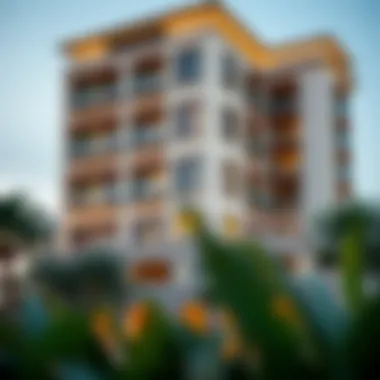
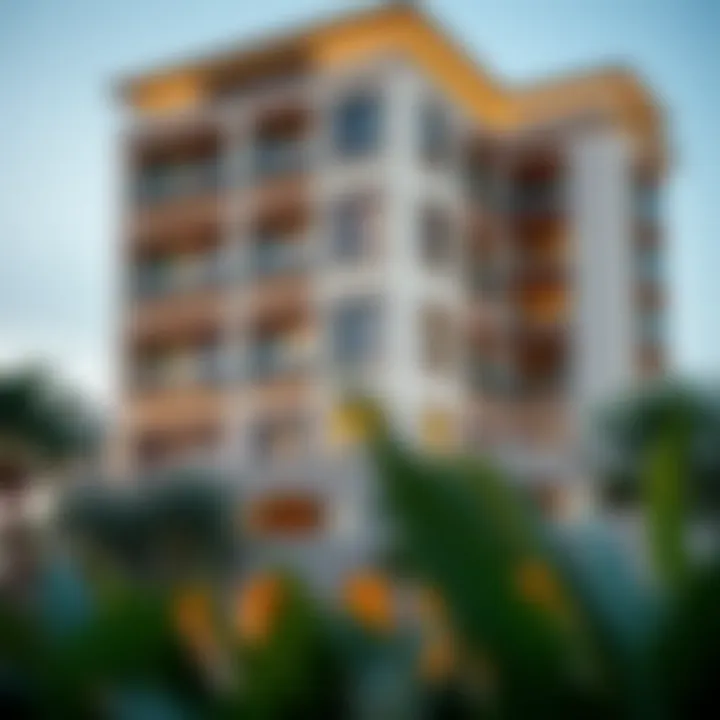
Historical Context
To understand the current landscape of freehold properties in Dubai, one must consider the historical context. In the past, ownership for expatriates was limited, primarily confined to leasehold agreements with strict conditions. However, in 2002, the government relaxed some of these restrictions by allowing specific areas to transition to a freehold model.
This pivotal change opened the doors for foreign investors, acting as a catalyst for the real estate market's subsequent boom. Now, areas like Dubai Marina and Palm Jumeirah stand as a testament to this transformation, showcasing luxurious residential options previously underserved by the old leasehold framework.
Regulatory Changes Over the Years
In the years following the initial introduction of freehold properties, regulatory changes have played a crucial role in shaping the market. The government has implemented a series of policies to protect investors and ensure transparency. As a result, buyer confidence has surged, encouraging more individuals to invest in the property sector.
For instance, the establishment of the Dubai Land Department has introduced clear processes for property registration, aiding in the reassurance of ownership rights. Additionally, the introduction of laws governing property management and rental regulations has created an environment conducive to both investment and tenant stability.
"The transformation of Dubai's freehold sectors represents not just a shift in property rights, but a reimagining of what living and investing in Dubai can mean for countless people."
Moreover, the ongoing updates to regulations reflect an awareness of market volatility, emphasizing consumer protection. These continuous adjustments highlight Dubai's commitment to maintaining a robust and transparent real estate market, ultimately ensuring investors can navigate their choices with confidence.
Major Freehold Districts in Dubai
When diving into the real estate scene of any city, it’s crucial to understand the districts that shape its property landscape. In Dubai, freehold areas stand out as beacons of potential for both local and foreign investors. These districts uniquely merge modern living with cultural richness, providing ample opportunities for residence as well as investment.
Exploring freehold districts gives insights into aspects like community, accessibility, and property types available, all of which play a pivotal role in decision-making for homebuyers and investors alike. This section will spotlight five major freehold neighborhoods in Dubai that are making waves in the real estate market, offering distinct characteristics that attract buyers.
Dubai Marina
Living Experience
Dubai Marina epitomizes a lifestyle many aspire to. Picture it: a magnificent canal lined with luxurious high-rises, upscale restaurants, and vibrant nightlife. The area’s waterfront appeal isn’t just for show. Many residents enjoy stunning views of yachts bobbing in the marina, creating a picturesque setting that comes alive, especially during evenings. The community here caters to both young professionals and families, offering an array of leisure amenities like beaches, parks, and shopping malls.
In Dubai Marina, residents often find a sense of belonging amidst the blend of nationalities, which creates a multicultural environment. While the perks are plenty, potential buyers should also consider the hustle and bustle that comes with such a lively locale; for some, this may transform from a charming lifestyle into an overwhelming experience.
Property Types Available
The property landscape in Dubai Marina is as diverse as its residents. One can find luxury apartments, lofts, and penthouses, offering various styles and sizes. The awe-inspiring buildings, many boasting modern architecture and state-of-the-art facilities, provide ample choice for varying budgets.
The area is particularly known for its high-rise apartments, where buyers seek both investment potential and lifestyle convenience. However, prospective owners should keep in mind annual service charges, which can be substantial in premium developments, sometimes proving a financial burden down the line.
Palm Jumeirah
Luxury Offerings
Palm Jumeirah is, without a doubt, a hallmark of luxury living in Dubai. This man-made island is a celebrated destination adorned with extravagant villas, high-end hotels, and private beaches. Buyers often flock here for the opulence and exclusivity that come with owning a piece of this paradise.
What sets Palm Jumeirah apart is not only its stunning views but also its reputation as a sanctuary for upscale living. The unique design adds to its allure, drawing those seeking to invest in high-value properties. However, potential buyers should remain aware of the premium price tags attached to properties here, which can be considerably higher than in other districts.
Real Estate Prices
Real estate prices in Palm Jumeirah are on the steeper side, reflecting its luxury appeal. Because this island is considered one of the most desired areas for residences, the demand often leads to a competitive market. The average property price per square foot can range dramatically, making it essential for investors to analyze their options carefully before committing.
Yet, despite the high initial investment, properties in Palm Jumeirah have historically shown resilient value growth, offering long-term potential for capital appreciation. Nevertheless, buyers need to consider the overall cost of ownership, which includes maintenance fees that come with upscale living.
Downtown Dubai
Market Trends
Downtown Dubai is often referred to as the heartbeat of the city. Home to iconic landmarks such as the Burj Khalifa and the Dubai Mall, it has become a focal point for real estate investment. The combination of cultural vibrancy and business hub functionality means that property trends here constantly evolve.
Recent market insights suggest that the demand for residential units remains robust despite fluctuations in global markets. Buyers are drawn to the convenience of amenities and transportation networks that underscore city living. However, this demand also drives prices upward, attracting both investors and end-users looking for homes.
Investment Insights
Investing in Downtown Dubai could yield substantial returns due to high rental yields and capital growth prospects. The ongoing development projects and improvements in infrastructure only enhance the area’s appeal. With continuous influxes of tourists and new residents, the real estate market here remains dynamic.
That said, competition is stiff. Investors need to be prepared to navigate the landscape and conduct thorough research to make informed decisions. Future developments are key to watch, as they can sometimes impact property values in unforeseen ways.
Dubai Design District
Target Market
Dubai Design District, also known as d3, caters primarily to creative professionals and businesses. This area is designed as a hub for art, fashion, and design, making it a unique choice for buyers who resonate with its artistic vibe. Artists and innovators are drawn here, creating a vibrant community that sets it apart from more traditional districts.
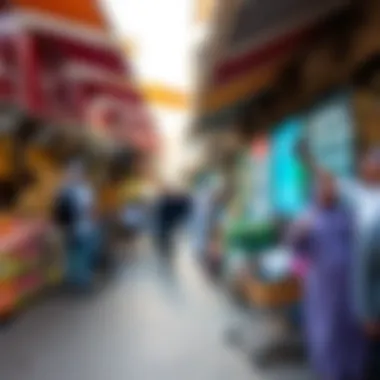

Investors will find value in supporting this burgeoning market as it attracts a niche crowd. However, it's pertinent to keep in mind that this may not appeal to every homeowner, especially those seeking family-centric communities or conventional residential environments.
Future Potential
The growth of Dubai Design District is notable, with plans for expansion and innovation continuously in the works. As art and design become increasingly valued in Dubai, property prices in this area stand to rise. Given the burgeoning influx of businesses and culture-focused initiatives, both buyers and renters are presented with promising opportunities.
Nonetheless, potential investors should remain vigilant, understanding that market trends in niche areas can be unpredictable. The creative market can be subject to fluctuations depending on economic conditions and societal interests.
Jumeirah Beach Residence
Community Overview
Jumeirah Beach Residence (JBR) is known for its lively beach atmosphere and family-oriented vibe. This waterfront community offers an extensive array of dining, shopping, and entertainment options right at residents’ doorsteps. Many families and expatriates find it an appealing place to live due to its blend of recreation and relaxation.
The attractive beachfront property enhances the living experience at JBR, where residents can unwind with views of the sea on their balconies. However, noise levels can vary, especially close to the beach promenade, which some may find distracting.
Rental Yield
Investors eyeing Jumeirah Beach Residence often appreciate the attractive rental yields available. The area has consistently enjoyed popularity with both tourists and locals, ensuring a steady demand for rental properties. As such, many property owners report favorable returns with short-term and long-term rentals.
Yet, while rental yields can be impressive, property management in such a busy area can also pose challenges, making it essential for landlords to stay on top of their investments and tenant relations.
In sum, each of these freehold districts in Dubai offers its own unique flavor while contributing to the vibrant tapestry of options available in the real estate market. For homebuyers and investors alike, understanding these neighborhoods is key to making informed decisions in the ever-evolving landscape of Dubai’s property scene.
Investment Opportunities in Freehold Areas
The real estate landscape in Dubai has transformed remarkably over the past few decades, providing various opportunities, particularly in freehold areas. For anyone considering investing in property, understanding these opportunities is crucial. They represent more than just investment; they signal a shift in lifestyle and the potential for significant financial returns.
The allure of freehold properties boils down to ownership without constraints that come with leasehold arrangements. Buyers can not only own the property outright but also have the flexibility to rent or even sell it according to their preferences. This autonomy often attracts both local and foreign investors who wish to stake a claim in Dubai’s booming market.
Moreover, freehold properties appeal to overseas investors who are seeking a foothold in one of the most dynamic economies in the world. The potential for appreciation in property values due to constant demand makes these investments enticing.
Attractiveness for Overseas Investors
Dubai’s freehold market has become increasingly attractive for investors from around the globe, and several factors contribute to this trend.
- Tax Benefits: One of the standout features of investing in Dubai is the lack of property taxes and capital gains tax, which is undoubtedly a plus for many. Unlike in other nations, without additional costs nibbling at your returns, investors can reap the benefits of their investments more fully.
- Strategic Location: Dubai’s geographical location makes it a gateway between East and West, creating a bustling hub for business, trade, and tourism. Properties here often command high rental yields, especially in popular districts like Downtown Dubai and Dubai Marina, which makes them appealing to income-seeking investors.
- Quality of Life: Investors are not just purchasing property; they are investing in a lifestyle. With world-class amenities, recreational facilities, and a robust infrastructure, Dubai offers an attractive environment for expatriates and citizens alike. The safety and stability of the UAE enhance this appeal even further.
- Strong Expat Community: The vibrant expat community makes increasing property demand inevitable. As more foreigners establish a life in Dubai, the need for housing continues to rise, thereby driving property prices up and securing a solid return for investors.
Trends in Property Investment
Keeping an eye on emerging trends within Dubai’s property market can offer investors invaluable insights.
- Sustainability and Green Living: There is a rising trend towards eco-friendly buildings and communities within Dubai. Properties that prioritize sustainability are increasingly attracting buyers who value environmental considerations. Expect to see more investments in green technology and sustainable designs.
- Technological Integration: The adoption of smart home technologies is becoming prevalent. Future properties with advanced technologies will potentially attract higher market demand due to convenience and efficiency. Investors should consider properties that showcase these features as they tend to retain their value well.
- Resilience Post-Pandemic: The pandemic has reshaped market dynamics. A noticeable shift towards more spacious homes with outdoor areas is noted, as buyers seek better living conditions. Investors may find particular value in properties that meet these evolving preferences.
- Short-Term Rentals: Given the high tourist inflow, short-term rental opportunities are on the rise. Property investors are increasingly looking at platforms like Airbnb to maximize their returns, making well-located apartment complexes particularly valuable investments.
Legal Considerations for Buyers
When stepping into the bustling world of real estate in Dubai, buyers need to familiarize themselves with the legal intricacies that govern freehold properties. Understanding the laws in place is essential not just for peace of mind, but to safeguard one’s investment.
Understanding Ownership Rights
In Dubai, freehold ownership grants foreign buyers complete ownership rights to their property. This means that, unlike leasehold arrangements where ownership is limited in time, freehold provides the autonomy to own, lease, or sell the property outright. However, it’s critical to know that there are specific regulations regarding real estate ownership for foreign nationals. For instance, while foreign investors can own freehold properties in designated areas, the limits can differ based on local laws and community regulations.
Buyers should also be aware of the implications of property ownership. Having freehold rights often includes responsibilities such as maintaining the property and adhering to community rules. One must diligently review the terms and conditions associated with the property and understand their rights over modifications, renovations, or renting out the space.
Property Registration Process
The registration process for purchasing property in Dubai is crucial, and it’s not just a walk in the park. Once the purchase agreement is signed, the next step is to register the property with the Dubai Land Department. This registration acts as a formal due diligence process to ensure that all legalities are satisfied.
- Obtain a No Objection Certificate (NOC) - This certificate from the developer confirms there are no outstanding payments on the property. It’s akin to a clean bill of health for your new investment.
- Secure Financing - If applicable, buyers should line up their financing before heading to registration. Many banks and financial institutions in the UAE offer competitive mortgage rates, but understanding the nuances of each offer is paramount.
- Submit Required Documents - Required documents typically include the passport, residency visa, sales and purchase agreement, and the NOC mentioned earlier. Each document needs to be in order, or you may find yourself jumping through hoops.
- Pay Registration Fees - Registration fees usually amount to 4% of the property’s value. Understanding this cost is vital as it can significantly influence your budget. Make sure your finances can accommodate this additional expense.
- Receive Title Deed - Once everything checks out, the buyer will receive a title deed, which officially confirms ownership. This deed is not just a document; it's your ticket to the property and should be safeguarded like a family heirloom.
"Navigating the legal landscape in Dubai can seem daunting, but understanding ownership rights and the property registration process is fundamental for any buyer in the freehold market."
Grasping these essential legal considerations ensures buyers can approach their investment in freehold areas with confidence, setting the foundation for a prosperous venture in Dubai's vibrant real estate market.
Advantages of Buying Freehold Property in Dubai
When diving into the complexities of Dubai's real estate market, understanding the advantages of freehold property ownership is paramount. As an investor, homebuyer, or even a seasoned real estate agent, recognizing these benefits can influence choices significantly. Freehold properties provide more than just a place to stay; they offer opportunities for investment, lifestyle choices, and long-term financial stability.
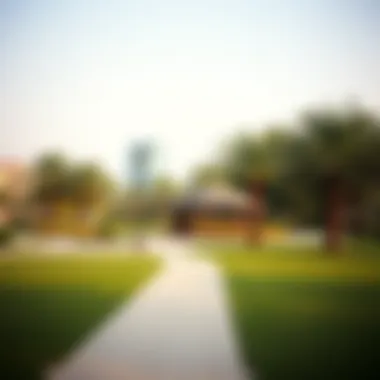

Long-Term Value
Investing in freehold property in Dubai often translates to significant long-term value. Quite simply, owning property outright allows for greater control over one's investment as compared to leasehold options. As the city continues to grow and evolve, areas that were once less sought after may see a boom in demand. This means that the value of freehold properties is likely to appreciate over time. For instance, neighborhoods like Dubai Marina and Palm Jumeirah have shown remarkable increases in property values, carrying implications for those who opted for freehold ownership.
A few key factors contribute to this long-term value:
- Capital Growth: Properties can appreciate significantly in popular areas, yielding higher returns on investments.
- Market Demand: As Dubai attracts businesses and expatriates, the demand for housing increases. Freehold properties become a preferred option, enhancing their marketability.
- Economic Growth: A booming economy often correlates with rising property values, making real estate one of the more stable investments in uncertain times.
Moreover, freehold ownership often means a more personal and emotional investment. When individuals own their home fully, the potential for connecting emotionally with that space increases, making it more likely that they will care for it, which in turn can maintain or навіть increase its value further.
Flexibility of Use
Another appealing aspect of owning freehold property in Dubai is the flexibility it provides in terms of usage. Unlike leasehold properties, which may restrict how a property can be utilized or renovated, freehold ownership offers buyers a certain level of autonomy. This flexibility opens up numerous possibilities for both personal and commercial use.
For example:
- Custom Modifications: Owners can remodel or renovate as they see fit. This can lead to enhanced comfort, utility, and even increase the property’s overall market value.
- Renting and Leasing: Freehold property owners might choose to rent out their residences, generating a source of passive income. Given the high demand for rental properties in Dubai, this can be an attractive option for many.
- Business Ventures: Certain freehold areas allow for both residential and business use, providing the chance for owners to run enterprises from their properties, fulfilling both residential and commercial needs.
"Flexibility in use not only empowers homeowners but also increases the overall essence of their investments."
The increasing trend toward flexible property use underscores a changing landscape in Dubai, where residents may see the value in having a space that can adapt to their evolving lifestyles.
Challenges in Freehold Investments
Navigating freehold investments in Dubai is not all sunshine and rainbows. While there are abundant opportunities, there are also hurdles that potential buyers and investors must take into account. It's crucial to have a firm grasp of these challenges to make informed decisions and protect one’s investment. In this section, we will dig into two primary concerns that often crop up: market volatility and regulatory worries.
Market Volatility
The real estate market in Dubai can be akin to a rollercoaster ride, with dizzying highs and perilous lows. Market volatility can significantly impact property values, making it essential for investors to stay plugged into the pulse of the sector.
Numerous factors contribute to these fluctuations:
- Economic Conditions: Global economic shifts can have a domino effect on Dubai's property market. For instance, a downturn in oil prices might lead to reduced demand for luxury housing.
- Political Stability: As the UAE is in a volatile region, any signs of political unrest can spook investors and buyers alike.
- Supply and Demand Changes: New residential developments coming to market can oversaturate certain areas, leading to lower property values.
Understanding market trends—like when properties are bought and sold, or which districts are gaining popularity—can enable savvy investors to ride the waves instead of being tossed around.
Regulatory Concerns
Buying property is like dancing in the dark if you're not aware of the rules of the game. The regulatory landscape in Dubai is quite fluid, which can create unexpected barriers for investors.
Here are several regulatory concerns that one must be aware of:
- Ownership Limitations: While freehold properties offer foreign ownership opportunities, certain areas still have restrictions that might catch investors off guard.
- Changing Laws: The legal frameworks governing real estate can change, which could directly impact ownership rights and responsibilities. It's not uncommon for investors to find themselves scrambling to understand new regulations or requirements.
- Registration Fees and Processes: Investors often overlook these fees until it’s too late. The registration process can be cumbersome and might vary by developer or area.
Investors should remain vigilant and do their homework regularly on policies and regulations to avoid any nasty surprises down the road.
Staying informed is not just a good practice in investment; it's a necessity in a market as dynamic as Dubai's real estate landscape.
In summary, while freehold property investments in Dubai come with a promising outlook, they are not without their challenges. Awareness and proactive engagement with market conditions and regulatory frameworks can make a significant difference in safeguarding investments and maximizing future returns.
Future of Freehold Areas in Dubai
The future landscape of freehold areas in Dubai is as multifaceted as the city itself, embodying both promise and challenge. As the government continues to play a pivotal role in shaping the property market, the potential for growth in these areas becomes ever clearer. The evolving dynamics of the economy, along with technological advancements, can significantly influence both demand and supply.
One of the core considerations in understanding the future of freehold properties lies in the various emerging markets within the city. Investors are increasingly looking beyond traditional hotspots like Downtown Dubai and Palm Jumeirah to explore neighborhoods that offer untapped potential. Investing early in these areas can yield substantial returns as development progresses. Furthermore, a clear grasp of predicted trends in buyer behavior and regulatory changes can enable stakeholders to make informed decisions.
Investment in Dubai's freehold sectors not only reflects the city's resilience but also its commitment to remain a global hub for luxury living and business opportunities.
Understanding these factors is crucial for real estate agents, investors, homebuyers, renters, and property managers alike, as each group seeks to carve out their niche in Dubai's rapidly evolving property market. Being informed about the future helps in navigating today’s decisions effectively.
Emerging Markets
Emerging markets within Dubai's freehold areas are capturing the attention of savvy investors and forward-thinking buyers. Neighborhoods such as Al Furjan and Dubai South are growing, attracting a diverse population. These areas often present lower entry costs compared to established districts.
- Al Furjan, for instance, is a developing community that boasts a blend of villas and apartments. It's steadily becoming popular among families and expatriates, offering a more tranquil living environment.
- Dubai South, meanwhile, is designed to accommodate the Expo 2020 legacy, promising impressive infrastructure and connectivity to the Al Maktoum International Airport.
These markets present a unique opportunity. Investors can benefit from competitive pricing now, which could appreciate over time as more developments are finalized. As the city expands, infrastructure improvements and community amenities will likely follow, making these locations increasingly desirable.
Predicted Trends
The trajectory of freehold areas in Dubai can be guided by several predicted trends that are reshaping the real estate landscape. Firstly, there is an emerging demand for eco-friendly and smart homes. As environmental concerns become more pressing, prospective buyers are leaning towards properties that showcase sustainability and energy efficiency.
Moreover, hybrid work environments have shifted what buyers are looking for in a home. Features such as dedicated home office spaces, community facilities, and access to green areas are gaining significant traction. This shift not only influences the design of new properties but also the expectations of existing ones.
Additionally, as digital technologies in real estate gain traction, buyers expect more transparency and efficiency in the purchasing process. Virtual tours, online registrations, and blockchain for secure transaction records are predicted to become standard practice.







